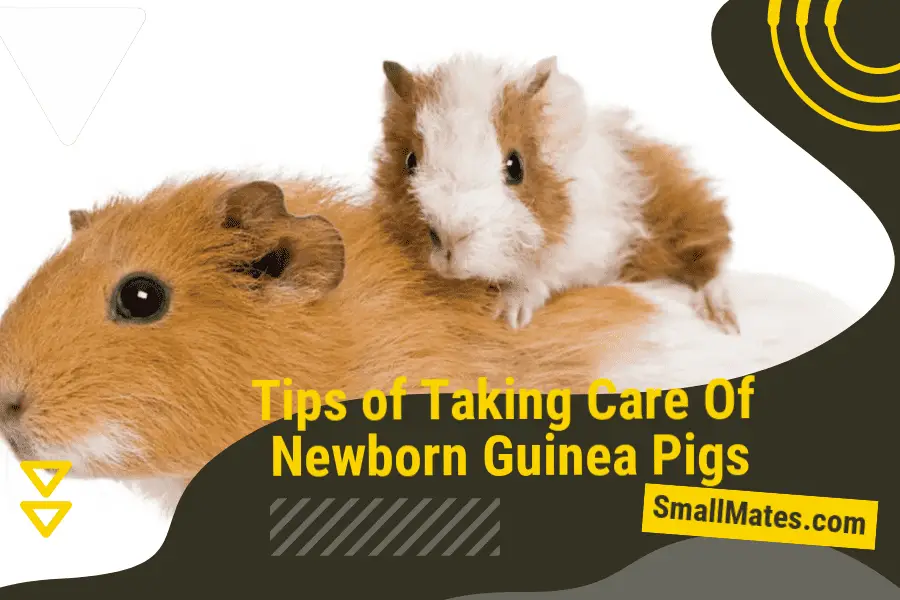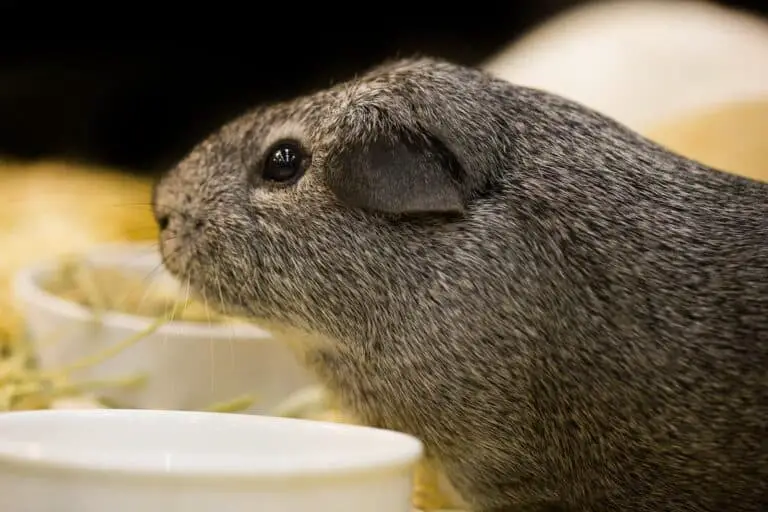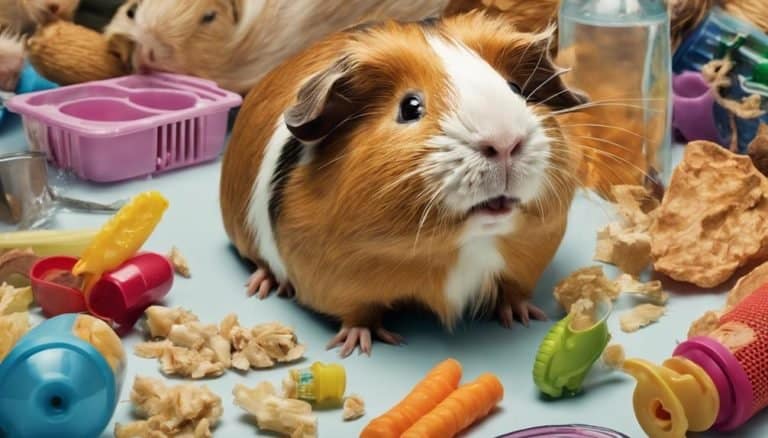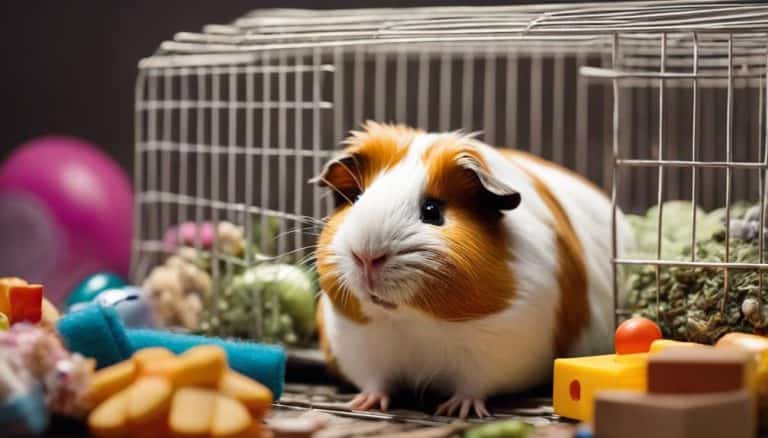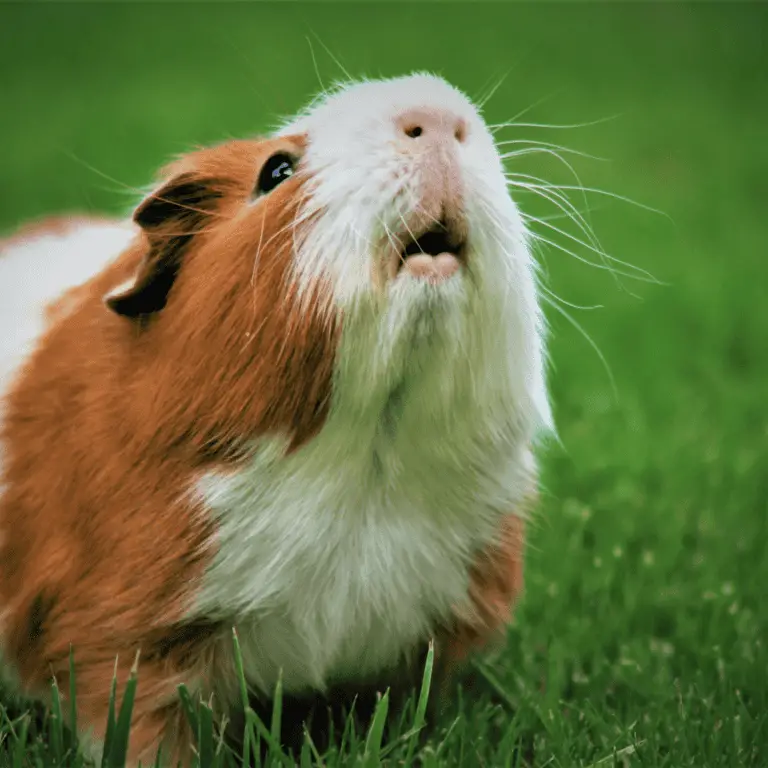Tips of taking care of newborn guinea pigs
Taking care of newborn guinea pigs is an incredibly rewarding experience. However, it can also be a bit overwhelming at first. The most important tip to remember when caring for newborn guinea pigs is that they need to be kept warm at all times.
Provide a nesting box with plenty of soft, absorbent bedding and make sure the temperature in the cage stays between 68-74°F. Also, provide a food and water dish specifically designed for their size.
Baby guinea pigs should have access to hay and fresh vegetables such as kale or carrots for healthy nutrition. Be sure to handle your baby guinea pigs gently and allow them time to get used to you before attempting any kind of physical contact.
Finally, regular vet visits are essential for newborn guinea pigs so that any potential health issues can be addressed promptly. With these tips in mind, you’ll be well on your way to providing the best care possible for your new furry family members!
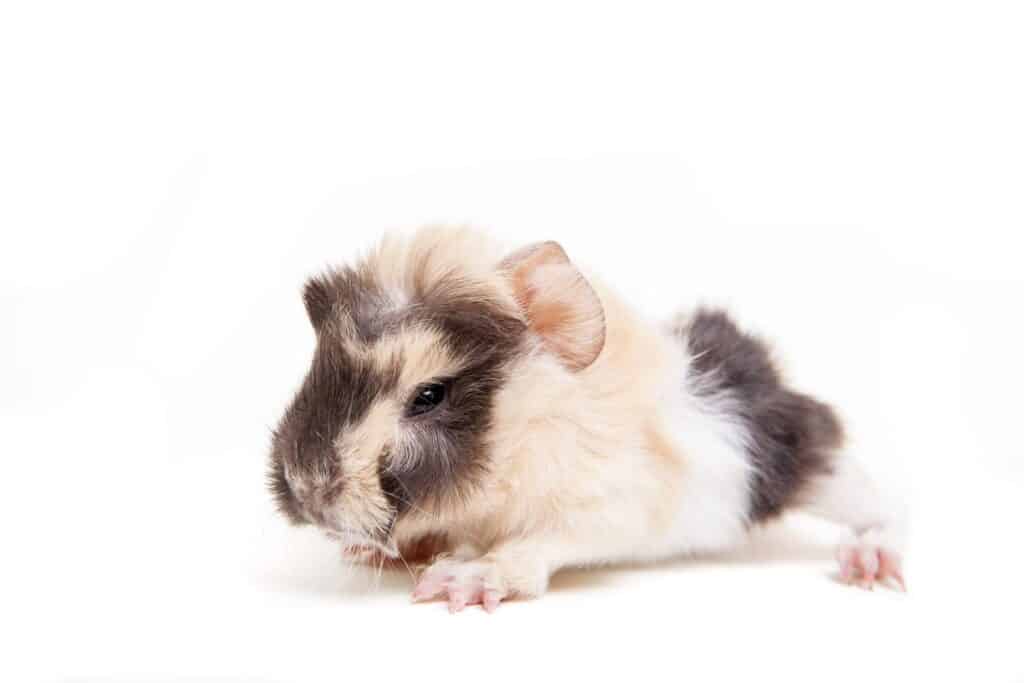
How Often Do Guinea Pigs Have Babies?
Guinea pigs are incredibly cute and fun animals, but they can also be quite prolific. Most female guinea pigs reach sexual maturity at around three months old, and can reproduce shortly afterwards.
After mating, the gestation period for a guinea pig is only about 60 to 72 days. This means that a single female guinea pig can have several litters of babies in one year if she remains healthy and the conditions are suitable. While this may sound overwhelming to many pet owners,remember that these small rodents are highly social creatures who need companionship, especially when they have young ones.
If you plan on getting a guinea pig as a pet, be aware of their reproductive habits so you can plan ahead and make sure you’re able to keep up with the growing demand for food and space!
What Does a Baby Guinea Pig Look Like?
A baby guinea pig, or pup, is a newborn guinea pig. They typically weigh between 3 and 5 ounces when they are born. Their fur is soft and can range in color from white to yellow or even brown.
They have big ears, small eyes, and their bodies are small and round. The coat of a newborn guinea pig will usually be short and may start to get longer as the pup grows older. As they mature, a guinea pig’s fur will become thicker and more luxurious.
They also have long whiskers that help them sense their environment around them. A baby guinea pig is very cute to look at and makes for an adorable pet as they grow up!

What Do Baby Guinea Pigs Eat?
Baby guinea pigs are typically weaned from their mother’s milk at around four weeks of age. At this point, they should begin eating solid food such as hay and a specially formulated guinea pig pellet. It is important to provide your pet with a good quality pellet that is specifically designed for guinea pigs.
You can also offer them fresh vegetables, fruits, herbs, and leafy greens as part of their diet but it is important to only feed these in moderation. When introducing new foods to your baby guinea pig, it is important to do so slowly and monitor the reaction to ensure that your pet does not have any adverse reactions or digestive problems.
Guinea pigs also need plenty of fresh water every day and if you opt for an open-top water bottle make sure to clean it regularly.
Can You Touch a Newborn Guinea Pig?
Touching a new guinea pig can be an exciting experience, but it should not be done without careful consideration. Newborn guinea pig pups are incredibly fragile and their immune systems are still developing, so it is important to make sure that the pup is safe before attempting to touch them.
If you have recently purchased a baby guinea pig, you should wait a few weeks for it to adjust to its new home before attempting to interact with it. When handling newborns, always make sure your hands are clean and use gentle strokes when petting the pup.
Never pick up a newborn guinea pig by its skin or fur as this could cause serious injury or even death. With appropriate precautions taken, interacting with a new guinea pig can be an enjoyable and rewarding experience.
How Long Do Baby Guinea Pigs Stay With Their Mothers?
Baby guinea pigs, or pups, usually stay with their mother until they are around 5-6 weeks old. At this age, they are fully weaned and ready to go to their new homes. During these weeks, the baby guinea pigs nurse from their mother, who provides them with the nourishment they need in order to grow and thrive.
Once the pups reach 5-6 weeks of age, they can be separated from their mother and taken to their new homes. It is important for baby guinea pigs to stay with their mother for at least five weeks so that they can get the nutrients they need and learn important socialization skills from her. As soon as a guinea pig pup is old enough and has been fully weaned by its mother, it can go to its new home.
Baby Guinea Pig Care — Have You Raised Baby Guinea Pigs?
Raising a baby guinea pig can be both exciting and rewarding, but it is important to take the time to do your research and properly prepare for their arrival. Baby guinea pigs need special care to ensure that they grow up happy and healthy.
As babies, they are more prone to illness and require frequent monitoring. It is important to make sure that you have a clean, comfortable environment with plenty of fresh food and water available at all times. You will also want to provide them with plenty of space to explore and play, as well as areas where they can hide if they feel scared or overwhelmed. Additionally, it is essential to provide them with regular handling so that they become accustomed to being around people.
By providing a loving and supportive home for your baby guinea pig, you can ensure that he or she will grow up into a happy and healthy adult guinea pig.
How to recognize a rejected baby guinea pig
A rejected baby guinea pig is a guinea pig that has been abandoned by its mother. It is important to recognize these animals as they require special care and attention.
To identify a rejected baby guinea pig, look for signs of distress such as crying or shaking, and also look for any physical signs of injury or weakness.
If the guinea pig is not moving around or has decreased activity, this could be a sign that it has been rejected by its mother. It is important to keep them away from other guinea pigs as they can spread illnesses due to their weakened immune system.
If you find a rejected baby guinea pig, it should be taken to an animal shelter or vet immediately for appropriate care.
How to care for a rejected newborn guinea pigs
When caring for a newborn guinea pig pup, there are a few things to keep in mind.
First, make sure the pup is in comfortable and warm environment. Newborn guinea pigs need to be kept warm and dry at all times.
Secondly, provide the pup with plenty of fresh water using a water bottle. Make sure to clean the water bottle regularly as this will reduce bacteria buildup.
Thirdly, feed the pup a specific formula made for newborn guinea pigs that can be purchased from any pet store.
Finally, provide plenty of hay and vegetables for the pup to nibble on as they grow. With proper care and attention, a rejected newborn guinea pig pup can become healthy and thrive in its new home!
Socializing Baby Guinea Pigs
When you bring home a baby guinea pig, it is important to begin socializing them early. This will help your pet become more comfortable around people, and it will also help create a stronger bond between you and your pet.
You can start by talking to the baby guinea pig in a gentle and soft voice, as this will help them recognize your voice and make them feel more secure in their new home. Additionally, you should provide plenty of treats when handling your guinea pig. This will encourage them to associate people with positive experiences.
As they get older, you can introduce them to other animals and people in order to get them used to different environments and personalities. Socializing baby guinea pigs may take some time and patience but it is an important part of creating a good relationship with your pet.
Food for Newborn Guinea Pigs
Newborn guinea pigs are born with a fully functioning digestive system, but they need different nutrition from adults. During the first four weeks of life, guinea pigs need to consume high-calorie and nutrient dense food in order to grow and develop. N
ewborn guinea pigs should have access to fresh hay and a specially formulated commercial guinea pig food that is designed for young pups. It’s important to offer the food multiple times per day as newborn guinea pigs can only consume small amounts of food at once.
During the first few weeks of life, it’s also essential for newborn guinea pigs to nurse regularly from their mother or receive an appropriate milk replacement formula if they are weaned too early. Providing nutrition-rich foods is extremely important for newborn guinea pigs as it will help them thrive during the formative weeks of their lives.
Housing Baby Guinea Pigs
Housing baby guinea pigs is a very important and exciting responsibility. Baby guinea pigs are very small and delicate, so they need to be kept in a safe, warm environment that is specifically designed for them.
It’s important to choose an enclosure that is large enough for the baby guinea pig to move around comfortably while still providing adequate protection from predators. The enclosure should also have plenty of space for your pet to explore and play.
Additionally, the cage should be equipped with hiding places and toys so that your baby guinea pig can get mental stimulation. Lastly, bedding must be provided in order to keep your pet comfortable and warm. With the right housing, you can ensure that your baby guinea pig will stay healthy and happy for many years to come!

